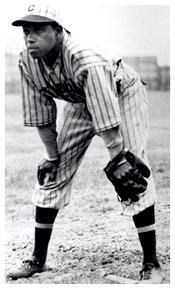

William Julius Johnson
Nicknames: Judy, Jing
Career: 1918-1937
Positions: 3b, ss, manager
Teams: Bacharach Giants (1918), Madison Stars
(1919-1921), Hilldale Daisies (1921-1929, 1931-1932), Homestead Grays (1930, 1937), Pittsburgh Crawfords (1932-1936)
Bats: Right
Throws: Right
Height: 5' 11'' Weight: 150
Born: October 26, 1900, Snow Hill, Maryland
Died: June 15, 1989, Wilmington, Delaware
National Baseball Hall of Fame Inductee (1975)
A cool, patient, sure-handed infielder with good range and a strong, accurate arm, he was an all-around great third baseman. Johnson was a good instinctive base runner, which offset his lack of outstanding speed. A right-handed line-drive hitter with an excellent batting eye, he hit for good average but not with exceptional power.
As a youngster he played football and baseball on the sandlots of Wilmington, Delaware, after his seaman father settled in the city and took a job as the athletic director of the Negro Settlement House. His father wanted him to become a pugilist and taught both him and his older sister the art of boxing, but Johnson preferred baseball. He attended school in his adopted hometown and, after completing one year at Howard High School, he terminated his formal education to take a job on the loading docks as a stevedore at Deep Water Point, New Jersey. In 1918 he joined the Bacharach Giants, having previously begun his semi-pro career with the Chester Stars of Chester, Pennsylvania. After the end of World War I he had a tryout with Hilldale and signed with the Madison Stars, a team that served as an unofficial farm team for Hilldale. After he had two years of seasoning, Hilldale, in need of an infielder, bought his contract back from the Stars for $100. In 1922 he signed his first contract for $135 per month; previously he had been playing for $5 a game.
As a rookie with Hilldale in 1921, he was moved to shortstop by manager Billy Francis, who played third base himself, but his range was a little limited for that position. Later switching to his natural position, he played with the great Hilldale clubs of the 1920s, posting batting averages of .391, .369, and .392 in 1923-25 to help them win pennants in the Eastern Colored League's first three years of existence. In the first World Series against the Kansas City Monarchs in 1924, he led the team with a .341 batting average in a losing cause. The following year, as Hilldale capped their third consecutive pennant with a World Series victory over the Monarchs, he recorded a .250 average and contributed crucial hits to the team effort. The next season Johnson moved into the clean-up spot in the batting order and hit .327 for the season. He continued as a key player with Hilldale for three more years, hitting .390 in 1929 while batting fifth.
He was always a smart baseball player, and after the 1929 season he left Hilldale for a season as playing manager of the Homestead Grays. Already an outstanding collection of talent, the team was transformed into the best team in black baseball by the end of the season, when Johnson inserted the youthful Josh Gibson into the lineup as the regular catcher.
After only one season in Homestead, he returned to Hilldale to take the managerial reins for his old ballclub for the last two years before the franchise's demise. During this period, the slick-fielding infielder played in the Cuban winter league and finished with a .334 batting average. In 1932 the slender third sacker left Hilldale again, joining the third superteam of his career as captain of Gus Greenlee's Pittsburgh Crawfords. Usually batting fifth, he continued his steady hitting with averages of .332, .333, .367, and .306. The Crawfords of 1935 are considered by most authorities to be the best black team of all time, while some argue that the team of 1936, Johnson's last season with the Crawfords, was even better.
In the spring of 1937 he and Josh Gibson were traded to the Homestead Grays for a small amount of cash and token players, but he retired shortly afterward and did not play substantially in the regular season. After leaving the baseball diamond he returned to Wilmington, worked as a supervisor for the Continental Can Company, and operated a general store with his brother. Later he scouted for the Philadelphia Athletics, Philadelphia Phillies, and Milwaukee Braves. One of the Braves' players, Bill Bruton, later became Johnson's son-in-law. Always a gentleman, when he retired in 1972 he had earned the respect of baseball players, executives, and fans.
The superb fielder's .309 lifetime batting average over a seventeen-year career in the Negro Leagues qualified him for induction into the National Baseball Hall of Fame in 1975.Fourteen years later, he died of a stroke at age eighty-eight.
Source: James A. Riley, The Biographical Encyclopedia of the Negro Baseball Leagues, New York: Carroll & Graf Publishers, Inc., 1994.

William "Judy" Johnson